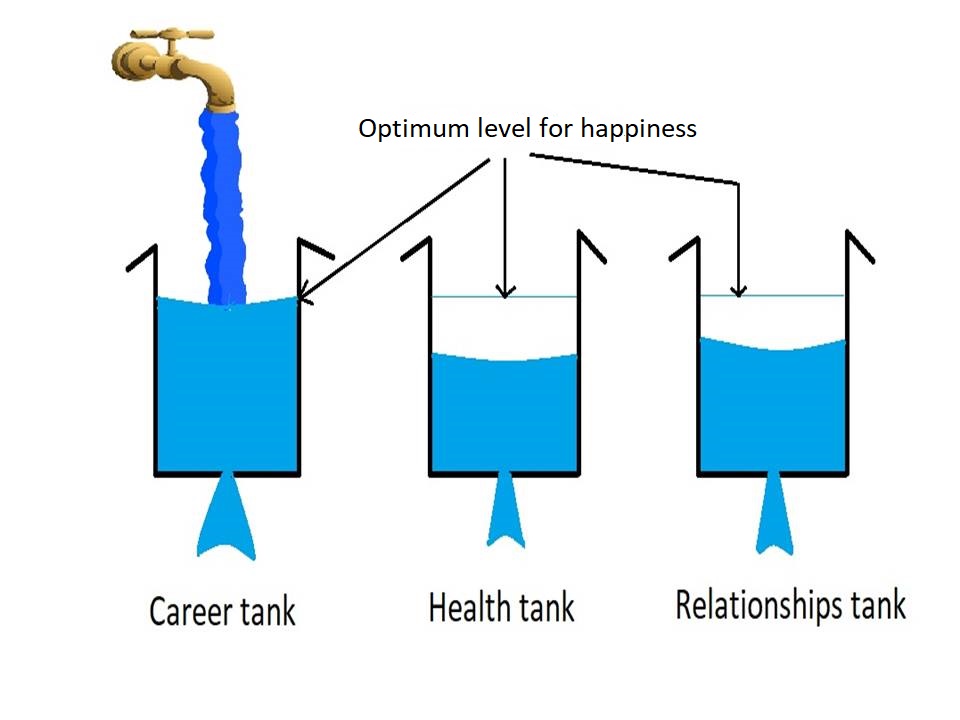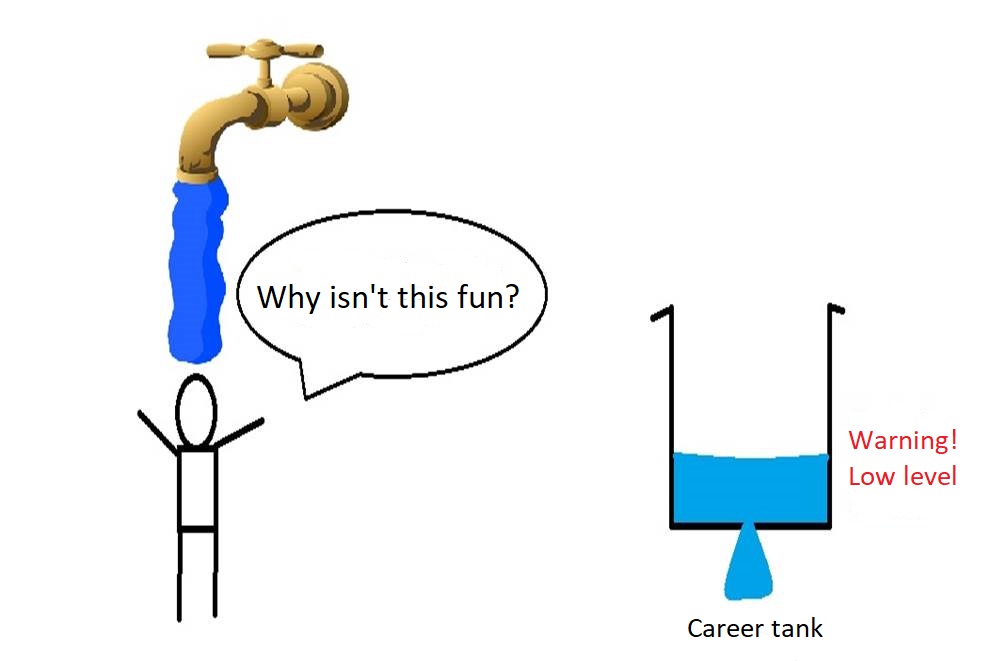Are you feeling overwhelmed and overburdened?
Do you want to reorganize your life?
We’ve all been there. I’ve been there countless times myself. If only I had a dollar every time I told my close friends that I wanted to get my life together. In this article, I want to share with you what I’ve learned about sorting your life out.
Before we can talk about how to get your life together, we need to understand the phenomenon. What’s going on when we get that urge to get our life in order and why do we get it?
Losing control
When we feel overburdened, there’s this sense that we’ve lost control over our lives. Now there can be several reasons behind this loss of control.
A common reason is procrastination. People often get the urge to get back control of their lives when they find themselves procrastinating. They’re not doing the important tasks that they should be doing.
And why is that?
Because chasing pleasure is a stronger motivation than chasing pain. Things we do when we’re procrastinating are often pleasurable. The important tasks we’re avoiding are often difficult or painful.
Our motivation to chase pleasure is deep-seated in our brains. It’s how our ancestors survived for millennia. It’s hard for us to convince ourselves that our important but difficult tasks are more beneficial for us in the long run. It’s the job of a more recently-evolved, but weaker conscious part of the brain.
Later, I’ll talk about how to win this battle against pleasure but there’s more to the story than procrastination.
Having to do too much
Yet another obvious reason for feeling overwhelmed is having too much on your plate. We humans are bad at multi-tasking. If you’re working on multiple projects at the same time, you’re likely to feel you’ve lost control over your life.
Our brains evolved in Palaeolithic times where the demands on them were few and simple. Today, we juggle multiple complex things at the same time and expect our brains to be okay with it. It’s not going to be.
Doing too much of one thing
The desire to get your life together also surfaces when you’re doing too much of one thing. For example, during exams, students often devote almost all of their time to studying. They can’t wait for the exams to be over so they can get their lives together.
So getting your life together isn’t only about focusing on productivity. Even if you’re super productive, you can still get this urge.
As in the case of students, workaholics may also get thoughts like:
“Once I get this project done, I’ll get my life together.”
All this suggests that when we get the urge to get ourselves together, we’ve moved too much in one direction. Our mind is trying to pull us back.
But why is that?
The tanks model
To get a clear idea of what’s happening, I’d like to present my very own ‘tanks model of happiness’. If you get this model, you’ll understand happiness. You’ll forget about all those silly ideas of ‘finding happiness within’.
According to this model, your happiness is determined by how well the three main tanks of your life are filled- career, health, and relationships.
Think of your career, health, and relationships as three water tanks- each with a leak at the bottom. To be happy, you have to maintain a sufficiently high water level in all three tanks.
How do the tanks get filled?
Imagine you just have one tap and the water flowing from it represents your time, effort energy, and attention. Your task is to keep moving the tap from tank to tank to re-fill the tank that needs to be re-filled.
You can never really close the tap. It’s always running. Even when you’re sleeping, time is flowing. Your tap is running.
Most people, when they’re young, focus on their career tank. They study and keep it filled. Many of them find they’ve been ignoring their health tank and relationships tank. So, at some point, they get the urge to get their life together. It’s basically their mind saying:
“Hey, the water level in your health and relationships tanks has gone too low”.
Similarly, some people spend too much time filling their relationships tank and ignore the other tanks. A point comes when they feel suffocated in their relationship. They feel their relationship hinders them from doing well in their career.
Of course, there are times when you need to focus on one tank more. For example, the career tank during exams. That’s alright but you can’t let the other two tanks go too low. If you do, you’ll get the feeling of wanting to re-organize your life.
If you exercise for just 15 minutes during your exams, you’ll have done something to fill your health tank. If you quit exercising entirely, you’ll be desperate for the exams to be over so you can get your life together (make a new exercising schedule).

Washing yourself
Occasionally, you might get under the tap and wash yourself. While this may not fill any tank, it’s still an important thing to do. It’s when you’re having a “me-time”. Things like indulging in your favorite hobby, reflecting on your life, having fun, etc.
These things are best enjoyed when done moderately. If your career tank level is low and you spend your time having fun, your mind will keep warning you about the depleted career tank. This takes the fun out of having fun.

The less you have to worry about filling up the tanks, the less you’ll feel the need to get your life together.
Getting a degree, for example, ensures that your career tank remains filled to a decent level. It fixes the leak partially. Eating healthy food fills your health tank and fixes the leak partially.
I say partially because getting a degree isn’t enough to get a good career and eating healthy isn’t enough to be healthy. There are still things you need to keep doing, to keep the tap flowing. You need to keep working at a job and keep exercising.
Still, closing the leak partially removes a lot of worry from your life.
Similarly, you need to keep working on your relationships. You can never fix the leaks entirely but, over time, you find that you can better balance keeping the tanks filled.
How to combat pleasure- biggest enemy of the tanks
When you ignore one tank, you might be filling other tanks. That’s okay because at least some tank is getting filled. If you have to work but you decide to talk to your spouse you don’t feel bad because at least you’re building your relationship with your spouse (filling the relationships tank).
The real trouble happens when you go overboard with washing yourself. Washing yourself is important but every time you do it you aren’t filling any tank. So it needs to be done sparingly or it’ll quickly overtake your life.
If you have important work to do, but you watch a football game instead, your mind will be pissed. You’re not filling any tank, just washing yourself over and over unnecessarily. The mind cares the most about the tanks.
If, instead of watching the game alone at home on TV, you decide to watch it live with a bunch of friends, you’d be washing yourself but also filling the relationships tank. Even if you have important work to do, you’ll feel slightly better than in the previous scenario.
Be it having fun when you should be working, eating junk food, or cheating in a relationship, pleasure is the enemy of all the tanks. It depletes all the tanks.
Your mind likes doing fun and easy things. You can use this to your advantage to overcome procrastination. Often, the reason we procrastinate is that our task is difficult and large. By making the task easy and small, you can overcome procrastination.
You can do this by breaking your large task into several small steps and- this is important- making the first step super easy to do.
For example, if you have to read a particularly difficult book, break the task down into several steps. It helps if you make a written checklist.
Set the first step as something like ‘Open the book’ and check it off once you do it. There’s a sense of achievement that comes with checking things off. It is motivating and keeps you going. Once you’ve checked that first item off, you want to proceed to the next steps- ‘Read the first chapter’ and so on.
Look at the systems and processes you have in place to reach your goals. Often, you’ll find that you get stuck in those steps that are too large and difficult. Break them down.
Dealing with distractions
We live in highly distracting times. It’s easier for us today to get side-tracked when we’re doing important work. When we’re working and experience the slightest discomfort, we can rush to our phones to get instant relief.
We’re highly pleasure-driven beings and it often comes in the way of our trying to fill our tanks. There’s no way out of this except to eliminate all options of chasing pleasure when undesirable.
Turn your phone off while you’re working or put it in another room. It’s going to be hard at first but, eventually, you’ll reap the rewards of greater focus. Don’t kid yourself that you’ll just check it once and be done with it. Recognizing you’re helpless before it is the only way to come out of its grips.
Similarly, not buying any junk food at all is the way to go. If it’s not in your house, it’s not in your mind.
Things you can’t control
I’m against setting rigid schedules. If you do that, you set yourself up for failure. You’ll find you often have to get your life together because your rigid schedule falls like a house of cards in the face of the slightest crisis or emergency.
Chaos is inevitable in life. You may come up with a beautiful plan for the day but something might happen that that’ll change your priorities. You don’t have control over everything.
Instead, what I suggest is making a flexible, fall-back schedule. This is how you expect your day to turn out and if it doesn’t that’s okay because you can fall back to it later. Having a fall-back schedule is better than having no schedule at all.
There’s being obsessive about scheduling and then there’s being too loose with it. You want to hit that sweet spot in the middle.
Re-organization = learning
While you don’t want to set rigid schedules that you have to re-organize often, this doesn’t mean you shouldn’t re-organize at all. You should re-organize when it’s useful to do so.
In my own work, I often find that I need to re-organize when I learn new things. Re-organizing tells me that I’m incorporating what I’ve learned. I avoid re-organizing simply for the sake of re-organizing.
When you’re learning, you’ll find that you need to re-organize a lot. Eventually, things will settle down and you’ll come up with robust systems and processes to reach your goals. You’ll find that you have to re-organize less often.
Step by step guide to getting your life together
When your life is all over the place, you have accumulated too many problems that are all demanding your attention. Your mind gets overburdened and you escape from it all by chasing pleasure, which itself becomes another problem for you to deal with.
Here’s a step by step guide that you can follow to de-clutter your mind and get your life together:
1. Write it all down
The best way to unburden your mind is to dump it all on paper. You can also type things on your devices but there’s something cathartic with writing things down. Write down everything that’s bothering you. This gives you a chance to look at your life and mind objectively.
It’s hard to deal with the things that are in your head when they’re in your head. Free your mind first.
2. Make three columns
These will be analogous to your tanks. Label them Career, Health, and Relationships. Almost all of your problems will fall under these three columns. Write your concerns about each of these life areas.
3. Prioritize
Some problems are immediate while others are not. Which ones do you want to tackle first? What goals would have the greatest positive impact on you? Have a system in place to deal with unimportant things. Jot down everything life throws at you in your to-do list so you can deal with it later. If it can be delayed, delay it.
4. Set goals
Goal setting is a skill you learn over time. Cliché as it may sound; you do need clear and specific goals. If you can’t see what you want to hit, you won’t hit it. Recognize that all goals take time to reach. Always think long-term when setting goals.
5. Clear path to the goals
Not only do you need well-defined and specific goals, but you also need a clear path to reaching those goals. Reaching goals is the process of moving from A to B over a period of time. You need to get clear about what you need to do to get from your current position (A) to a future, desirable position (B).
As I pointed out in my article on overcoming challenges, you’ll often find that your initial theory about reaching a goal is wrong. That’s okay because you need to keep refining it till you learn what works. Try one thing. Fail. Try another thing. Fail again. Eventually, you will find what works.
6. Track your goals
I can’t stress this enough. Reaching important goals is always a long-term process. You can easily get side-tracked if you think your efforts aren’t bearing fruit. This is why tracking is important.
If your initial theory about how to reach your goal is wrong, tracking will tell you that. If you’re on the right track, tracking will tell you that too and motivate you.
Make your goals as measurable as possible, as mathematical as possible. I recently set a goal of losing weight. To make it specific and measurable, I decided to bring my body fat down to 12%. Last month it was 25%. So I had to move from A (25%) to B (12%).
Of course, losing weight depends on your diet and exercise. I made a new exercise schedule and followed it for a month. This month, my body fat dropped to 22%. This tells me I’m on the right track. It also tells me that if I keep doing what I’m doing, I should reach B in about 3 months. Very motivating.
7. Fill your tanks every day
When you make your plan each day, make sure what you do fits well with your long-term goals. Don’t just think about today. Think about how your today connects with your future. Your tanks will take time to get filled to the desired level.
A successful day is where you’ve filled the most important tank you wanted to fill, without ignoring the other tanks too much. An ideal day is where you fill each tank and also wash yourself satisfactorily.

